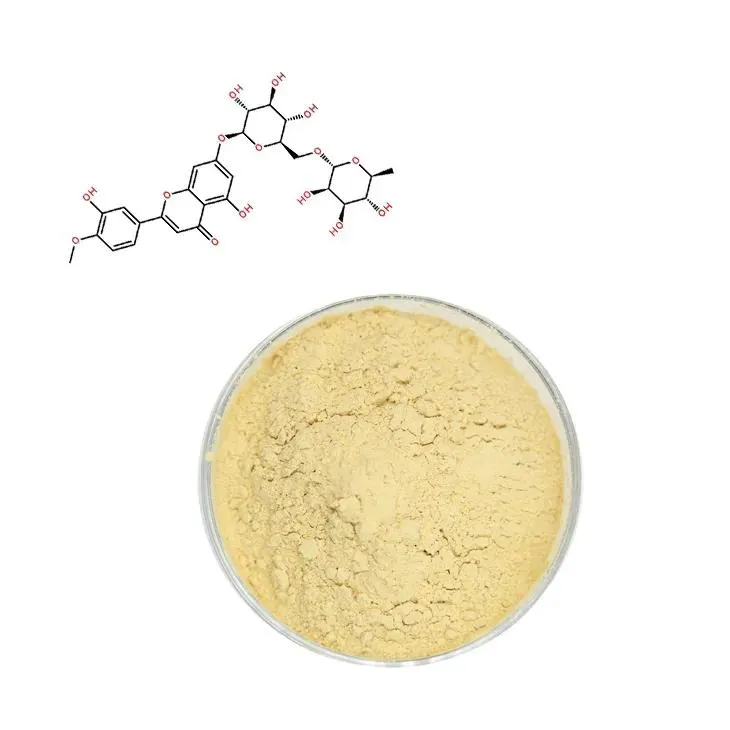- 0086-571-85302990
- sales@greenskybio.com
Is diosmin good for liver? A Comprehensive Analysis
2025-07-14

Diosmin, a naturally occurring flavonoid primarily found in citrus fruits, has gained attention in recent years for its potential health benefits. Known for its antioxidant and anti-inflammatory properties, Diosmin is commonly used in supplements aimed at improving vascular health, particularly in treating chronic venous insufficiency and hemorrhoids. However, its role in supporting liver health is an emerging area of study worth exploring. This article delves into the potential benefits of Diosmin for liver health, examining scientific evidence and practical applications.
Understanding Diosmin and Its Mechanisms
Diosmin is a bioflavonoid, a type of compound known for its high antioxidant capacity, which helps neutralize harmful free radicals in the body. The liver, being a critical organ responsible for detoxification and metabolic processes, is prone to oxidative stress and inflammation. These factors can contribute to liver damage and diseases such as fatty liver disease, hepatitis, and cirrhosis. Therefore, compounds like diosmin that possess antioxidant properties may offer protective benefits for liver health.
Diosmin is believed to exert its effects through several mechanisms:
1. Antioxidant Action: By scavenging free radicals, diosmin helps reduce oxidative stress in the liver, protecting liver cells from damage and supporting overall liver function.
2. Anti-inflammatory Properties: Inflammation is a key factor in liver disease progression. Diosmin's ability to inhibit the release of inflammatory mediators can help mitigate inflammation within the liver.
3. Improvement of Microcirculation: Diosmin enhances microcirculation and blood flow, which can be beneficial for the liver by ensuring adequate oxygen and nutrient delivery while facilitating waste removal.

Scientific Evidence on Diosmin and Liver Health
While the benefits of diosmin for vascular health are well-documented, research specifically examining its impact on liver health is limited but growing. Below we explore available studies and their findings:
1. Animal Studies:
Some animal studies have indicated that diosmin may protect against liver damage. For example, research on rats has shown that diosmin supplementation can reduce liver enzyme levels indicative of liver damage while improving histological liver architecture. These studies suggest that diosmin helps counteract liver fibrosis and fatty liver disease by lowering markers of oxidative stress and inflammation.
2. Human Studies:
Although human studies are sparse, those investigating flavonoids in general suggest potential liver benefits. While direct clinical trials of diosmin on liver health in humans are needed, existing data on its positive impact on inflammation and oxidative stress hint at possible liver-protective effects.
Despite the absence of comprehensive human studies, the promising results observed in preclinical research underline the need for well-conducted clinical trials to definitively establish diosmin's role in liver health.
Potential Benefits for Liver Conditions
Given its antioxidant and anti-inflammatory properties, diosmin may offer benefits for several liver-related conditions:
- Non-Alcoholic Fatty Liver Disease (NAFLD): NAFLD is characterized by the accumulation of fat in liver cells, often linked to oxidative stress and inflammation. Diosmin’s potential to reduce these factors could be beneficial in managing NAFLD, helping prevent progression to more severe forms of liver disease.
- Liver Fibrosis: Liver fibrosis involves the excessive accumulation of extracellular matrix proteins, often as a result of chronic inflammation. By mitigating inflammation and oxidative damage, diosmin may slow or prevent the development of fibrosis.
- General Liver Health: As part of a holistic approach to maintaining liver health, diosmin could complement dietary and lifestyle interventions aimed at reducing liver stress and damage.
Practical Applications and Considerations
To incorporate diosmin effectively as part of a liver health regimen, consider the following:
1. Supplementation: Diosmin is available as a dietary supplement, frequently combined with Hesperidin, another citrus flavonoid. When selecting a supplement, it's essential to opt for reputable brands that provide clear, standardized dosages.
2. Diet and Lifestyle: While diosmin may have protective properties, it should not be relied upon as the sole preventive measure. Maintaining a balanced diet rich in antioxidants, engaging in regular physical activity, moderating alcohol consumption, and managing weight are critical for overall liver health.
3. Consultation with Healthcare Providers: Before starting any new supplement, including diosmin, consult with healthcare professionals, particularly if you have pre-existing liver conditions or are taking medications, as there may be potential interactions or contraindications.
Conclusion
While direct evidence of diosmin’s efficacy in promoting liver health is still emerging, its well-established antioxidant and anti-inflammatory properties provide a plausible basis for its protective potential. Current animal studies offer encouraging insights, suggesting that diosmin may help mitigate oxidative stress and inflammation, critical factors in liver damage. Nevertheless, more research, particularly involving human trials, is needed to concretely establish its benefits for liver health. As interest in natural health solutions grows, diosmin may increasingly be recognized as a complementary component of liver care strategies, supporting overall wellness and vitality.
- ▶ Hesperidin
- ▶ Citrus Bioflavonoids
- ▶ Plant Extract
- ▶ lycopene
- ▶ Diosmin
- ▶ Grape seed extract
- ▶ Sea buckthorn Juice Powder
- ▶ Fruit Juice Powder
- ▶ Hops Extract
- ▶ Artichoke Extract
- ▶ Mushroom extract
- ▶ Astaxanthin
- ▶ Green Tea Extract
- ▶ Curcumin
- ▶ Horse Chestnut Extract
- ▶ Other Product
- ▶ Boswellia Serrata Extract
- ▶ Resveratrol
- ▶ Marigold Extract
- ▶ Grape Leaf Extract
- ▶ New Product
- ▶ Aminolevulinic acid
- ▶ Cranberry Extract
- ▶ Red Yeast Rice
- ▶ Red Wine Extract
-
Mango flavored powder
2025-07-14
-
Tongkat Ali Extract Powder
2025-07-14
-
Baicalin
2025-07-14
-
Tongkat Ali Extract
2025-07-14
-
Uridine-5'-monophosphate Disodium salt
2025-07-14
-
Acai Berry Extract
2025-07-14
-
Stevia Extract
2025-07-14
-
Red Date Extract
2025-07-14
-
Cranberry Extract
2025-07-14
-
Acerola Juice Powder
2025-07-14





















